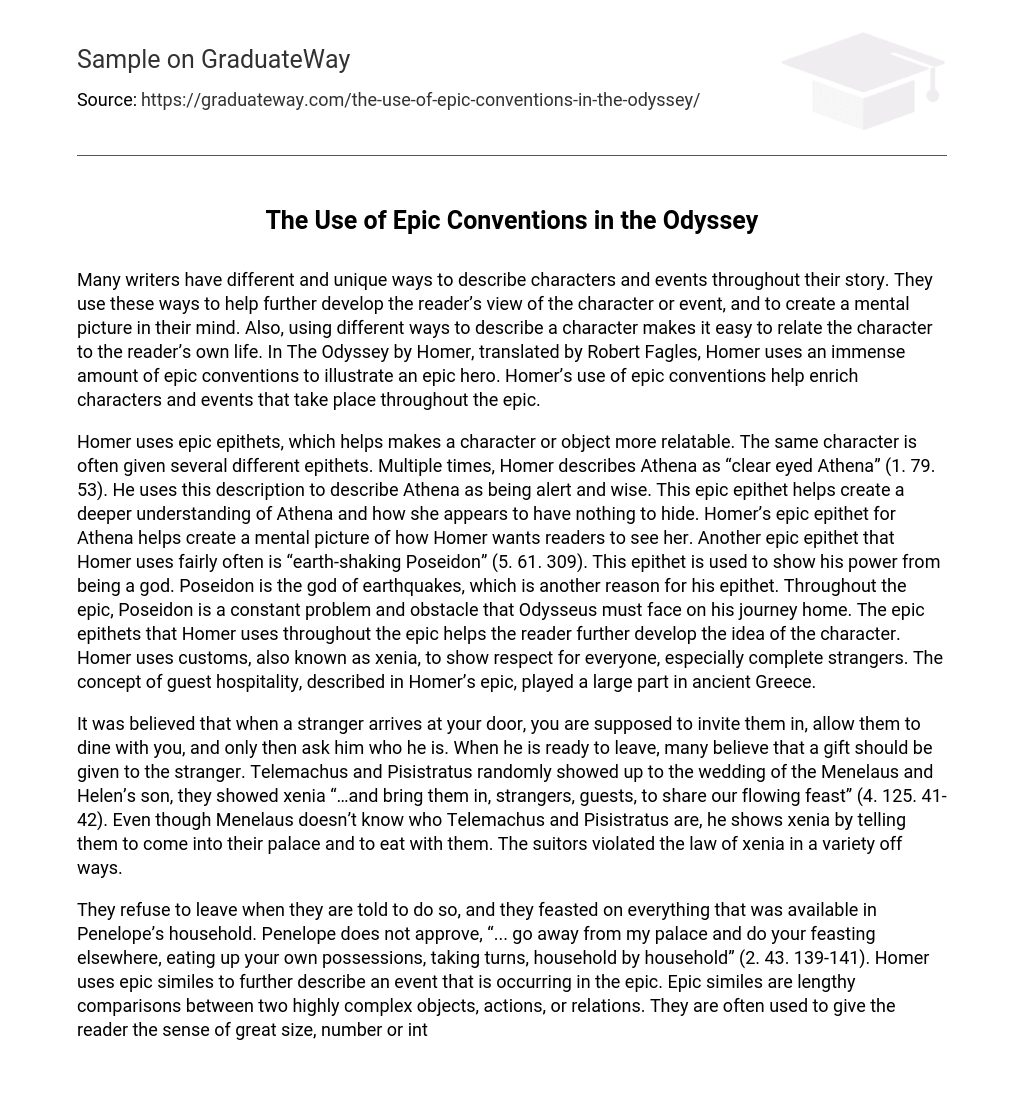Many writers have different and unique ways to describe characters and events throughout their story. They use these ways to help further develop the reader’s view of the character or event, and to create a mental picture in their mind. Also, using different ways to describe a character makes it easy to relate the character to the reader’s own life. In The Odyssey by Homer, translated by Robert Fagles, Homer uses an immense amount of epic conventions to illustrate an epic hero. Homer’s use of epic conventions help enrich characters and events that take place throughout the epic.
Homer uses epic epithets, which helps makes a character or object more relatable. The same character is often given several different epithets. Multiple times, Homer describes Athena as “clear eyed Athena” (1. 79. 53). He uses this description to describe Athena as being alert and wise. This epic epithet helps create a deeper understanding of Athena and how she appears to have nothing to hide. Homer’s epic epithet for Athena helps create a mental picture of how Homer wants readers to see her. Another epic epithet that Homer uses fairly often is “earth-shaking Poseidon” (5. 61. 309). This epithet is used to show his power from being a god. Poseidon is the god of earthquakes, which is another reason for his epithet. Throughout the epic, Poseidon is a constant problem and obstacle that Odysseus must face on his journey home. The epic epithets that Homer uses throughout the epic helps the reader further develop the idea of the character. Homer uses customs, also known as xenia, to show respect for everyone, especially complete strangers. The concept of guest hospitality, described in Homer’s epic, played a large part in ancient Greece.
It was believed that when a stranger arrives at your door, you are supposed to invite them in, allow them to dine with you, and only then ask him who he is. When he is ready to leave, many believe that a gift should be given to the stranger. Telemachus and Pisistratus randomly showed up to the wedding of the Menelaus and Helen’s son, they showed xenia “…and bring them in, strangers, guests, to share our flowing feast” (4. 125. 41-42). Even though Menelaus doesn’t know who Telemachus and Pisistratus are, he shows xenia by telling them to come into their palace and to eat with them. The suitors violated the law of xenia in a variety off ways.
They refuse to leave when they are told to do so, and they feasted on everything that was available in Penelope’s household. Penelope does not approve, “… go away from my palace and do your feasting elsewhere, eating up your own possessions, taking turns, household by household” (2. 43. 139-141). Homer uses epic similes to further describe an event that is occurring in the epic. Epic similes are lengthy comparisons between two highly complex objects, actions, or relations. They are often used to give the reader the sense of great size, number or intensity. “During his meditation, a heavy surge was taking him, in fact, straight on the rocks.
He [would have] been flayed there, and his bones broken, had not grey-eyed Athena instructed him: he gripped a rock-ledge with both hands in passing and held on, groaning as the surge went by, to keep clear of its breaking. Then the backwash hit him, ripping him under and far out. An octopus, when you drag one from his chamber, comes up with suckers full of tiny stones: Odysseus left the skin of his great hands torn on the rock-ledge as the wave submerged him. And now at last Odysseus would have perished, battered inhumanly, but he had the gift of self-possession from grey-eyed Athena” (5. 64-165. 443-57). This simile is an extended comparison between the way the sea pulls Odysseus out off the rocks to the way a fisherman pulls an octopus out of its lair. The epic similes that Homer uses to describe characters or events that are taking place in the book help create a deeper understanding of what is going on. In society, epic conventions are used subconsciously. Homer himself was blind and used epic epithets to give characters and events more meaning. Humans use epic conventions in the real world in order to further their understanding, just as Homer does throughout the epic.





